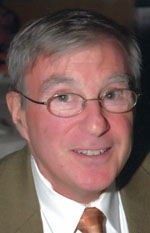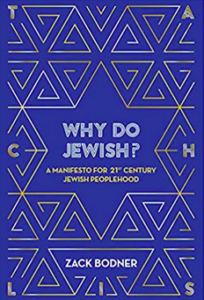By Fred Reiss, Ed.D.

WINCHESTER, California – Prognostication is very difficult, particularly as it pertains to the future.
Zack Bodner, having extensive background in Jewish communal life and currently the CEO of the Oshman Family Jewish Community Center, Palo Alto, CA, draws on his expertise in his book Why Do Jewish, in which he interprets the proverbial tea leaves concealing the fate of Judaism in the years ahead by examining current thinking, evaluating modern trends, and making predictions.
Bodner, aware that too often traditional Judaism fails to meaningfully meet the needs and demands of contemporary Jewish-American life, advances answers to such questions as “Why be Jewish?”, “What is Judaism today?”, and “How do we perform Judaism?” The thrust of his discourse shifts the burden of Judaism from “being” Jewish to “doing” Jewish, reminiscent of Pirke Avot’s dictum (1:17), “Study is not the most important thing, but actions [are].”
He argues in the past, Judaism dictated what it meant “to be” Jewish, but this method of operation no longer applies; we are at “an inflection point”, requiring a different approach to Judaism, including re-examining our relationship with synagogues, transforming the connection between Israel and diaspora Jews, and incorporating technology, all of which offer a path to relevancy and commitment, what it means “to do” Jewish.

Why Do Jewish presents and examines five megatrends: abandoning traditional institutional affiliation, shifting Jewish cultural patterns, change in meaning and belonging to the Jewish people, and evolving technology and its impact on Judaism. Whole books can be written on each of these, yet Bodner skillfully lays out their parameters and conclusions. “Before the Enlightenment in the mid eighteenth century,” writes Bodner, “if you were Jewish, it defined everything about you,” including dress, food, whom you married, and so forth. In the future we have the possibility of widely-spaced conclaves of Jews waxing and waning in membership as they balance their spiritual and secular needs, and rejecting or altering Jewish traditions as needed.
He notes that even today, if the Jewish Seder date falls at a time when the extended family cannot be together, it is not unheard of for the family to hold a Seder at an “appropriate” time. It then becomes no great leap to continually amend the Jewish calendar as needed. While for some, these actions might be considered heretical, they are just a continuation of trends already in motion, vivified by the balkanization of American Jewry into various movements.
Why Do Jewish describes numerous secular organizations, including Jewish community centers, which entice disaffected Jews through experiential conferences, programs, and trips, directing them toward “Jewish Peoplehood”, if not religious life. For Bodner, the forces creating the paradigm shift push Jews away from a Jewish-centered life, and its anecdote centers on “action” in the form of his acronym TACHLIS, the Yiddish word meaning “getting down to business.” These are: T—Tikkun Olam, restoring the world, A—Arts and Culture, C—Community, H—Holidays and Rituals, L—Learning, I—Israel, and S—Shabbat and Spirituality. He also suggests American Jewry adopt a “Jewish LEAP year, an acronym for Learning, Experience, Action, and Peoplehood, a “new take on the gap year experience” focusing on Jewish ideals.
Using personal stories and insights from contemporary rabbis and scholars, Bodner creates an “ideological scaffolding of Jewish life,” some of which neither Bubba nor Zayde will recognize. He believes without aggressively adapting modern advances, Judaism is at risk of becoming ineffectual, and his points are well taken. In the Talmud (Berakhot 45a), the question is asked how to apply Jewish law, the response: Go out and see what the people are doing. This is the thesis of Why Do Jewish.
*
Fred Reiss, Ed.D. is a retired public and Hebrew school teacher and administrator, and author of a number of books, including The Jewish Calendar: History and Inner Workings and The Comprehensive Jewish and Civil Calendars, 2001 to 2240. He may be contacted via fred.reiss@sdjewishworld.com and info@fredreissbooks.com.